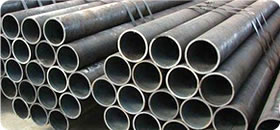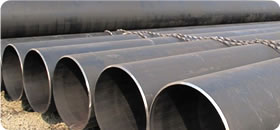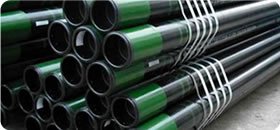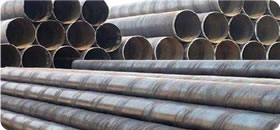Role of the component
2016-07-22 16:06:29 COMMENT:0 HITS:
1. Carbon (C): carbon content in steel increases, the yield point and tensile strength increased, but the ductility and impact resistance decreases when the carbon content exceeds 0.23%, weldability deteriorates, and therefore for soldering low alloy steel, carbon content of not more than 0.20%. But it also reduces the amount of high carbon steel atmospheric corrosion resistance, high carbon steel in the open-air yard would easily corroded; moreover, carbon can increase sensitivity to cold brittleness and aging steel.
2. Silicon (Si): Silicon added as a reducing agent in the steel making process and deoxidizer, so killed steel containing 0.15-0.30% silicon. If the silicon content in the steel exceeds 0.50-0.60%, even if the alloying element silicon. Silicon can significantly improve the steel elastic limit, yield point and tensile strength, it is widely used as a spring steel. Added 1.0-1.2% silicon in quenched and tempered steel, the strength can be increased by 15-20%. Silicon and molybdenum, tungsten, chromium, combined with improving corrosion resistance and oxidation effects, can produce heat-resistant steel.1-4% silicon low carbon steel with high magnetic permeability silicon steel for electrical industry to do. Increase the amount of silicon will reduce weld ability.
3. Manganese (Mn): In the steel making process, manganese good deoxidizer and desulfurizer, generally 0.30-0.50% manganese steel. In carbon steel added 0.70% or more even if the "manganese steel" steel than the average amount of steel not only has enough toughness, and has high strength and hardness, improved hardenability of steel to improve the hot workability of steel, 40% higher than the A3 as 16Mn steel yield point. 11-14% manganese steels have high wear resistance, used excavator bucket, ball mill liners and the like. Manganese content increased, decreased corrosion resistance of steel to reduce welding performance.
4. Phosphorus (P): In general, phosphorus is harmful elements in steel, increased cold brittleness of steel, welding performance deterioration, lower ductility, so cold bending performance deterioration. So usually require steel phosphorus content less than 0.045%, high-quality steel requires lower.
5. Sulfur (S): sulfur is usually harmful elements. Produce hot brittleness of the steel, reduce the ductility and toughness of steel, causing cracks in the forging and rolling. Sulfur is also detrimental to the welding performance, reduce corrosion resistance. So usually require a sulfur content of less than 0.055%, 0.040% lower than the requirements of high-quality steel. Added 0.08-0.20% sulfur in the steel can be improved machinability, commonly referred to cutting steel.
6. Chromium (Cr): the structural steel and tool steel, chromium can significantly improve the strength, hardness and wear resistance, but lower ductility and toughness. Chromium steel can improve the oxidation resistance and corrosion resistance, stainless steel is therefore an important element of heat-resistant steel alloy.
7. Nickel (Ni): Nickel can improve the strength of steel, yet maintain good ductility and toughness. Nickel has a higher acid corrosion resistance, high temperature anti-rust and heat capacity. But because Nickel is relatively scarce resources, it should be possible to use other alternative alloying elements nickel-chromium steel.
8. Molybdenum (Mo): Molybdenum makes grain refinement of steel, hardenability and improve thermal performance, maintain sufficient strength at high temperatures and creep resistance (long subjected to stress at high temperature, deformation, said creep). Adding molybdenum steel, can improve the mechanical properties. It can also suppress the fire due to the brittleness of steel caused. In tool steel can improve sexual red.
9.Titanium (Ti): Titanium is a strong deoxidizer in steel. It enables the internal structure of the steel dense grain refinement force; reduce aging sensitivity and cold brittleness. Improve welding performance. Adding the appropriate titanium in nickel-chromium 18 9 austenitic stainless steel, to avoid intergranular corrosion.
10. Vanadium (V): Vanadium is an excellent steel deoxidizer. Steel 0.5% vanadium can be refined grain organizations, improve the strength and toughness. Vanadium carbide and carbon formed at high temperature and pressure can increase resistance to hydrogen corrosion.
11. Tungsten (W): tungsten melting point higher than the major, students are expensive alloying elements. Tungsten carbide with carbon has high hardness and wear resistance. In addition tungsten tool steel, can significantly increase the red hardness and heat resistance, for cutting tools and forging mold.
12.Niobium (Nb): niobium can reduce grain refinement and thermal sensitivity of steel and temper brittleness, improve strength, ductility and toughness but declined. Niobium in an ordinary low alloy steel can improve the resistance to hydrogen, nitrogen, ammonia corrosion under atmospheric corrosion resistance and high temperature. Niobium can improve the welding performance. Plus niobium in austenitic stainless steels, to prevent inter-crystalline corrosion.
13.Cobalt (Co): Cobalt is a rare precious metal, used for special steels and alloys, such as heat resistant steel and magnetic materials.
14. Copper (Cu): Wuhan Iron and Steel with Daye steel refining ores often contain copper. Copper can improve the strength and toughness, in particular atmospheric corrosion. The disadvantage is that during thermal processing prone to thermal embrittlement significantly reduces the copper content exceeds 0.5% plastic. When the copper content is less than 0.50% had no effect on weldability.
15. Aluminum (Al): Aluminum is commonly used in steel deoxidizer. Steel was added a small amount of aluminum, can be refined grains, increase the impact toughness, such as deep-drawing steel sheet 08Al. Aluminum also has anti-oxidation and corrosion resistance, aluminum and chromium, silicon combination, can significantly improve the ability of the skin can not afford high-temperature steels and high temperature corrosion performance. The disadvantage is the effect of aluminum hot workability of steel, weldability and machinability.
16. Boron (B): Boron steels can be improved by adding small amounts of dense and hot-rolled steel performance, increase strength.
17.Nitrogen (N): Nitrogen can improve the strength of steel, the low temperature toughness and weldability, increasing aging sensitivity.
Hebei Shengtian Group Reaguan Pipeline Co.Ltd is mainly produce seamless steel pipes, SSAW steel pipes, spiral steel pipes, ERW steel pipes. Size is from 1/4” to 140”. Thickness is from sch20 to sch160. Material :Caron steel, ASTM A106 GR.B. ASTM A53, API5l Grb. Stainless steel: 304/304L, 316/316L. And alloy steel pipes.
Welcome you to join us and seek common development.
2. Silicon (Si): Silicon added as a reducing agent in the steel making process and deoxidizer, so killed steel containing 0.15-0.30% silicon. If the silicon content in the steel exceeds 0.50-0.60%, even if the alloying element silicon. Silicon can significantly improve the steel elastic limit, yield point and tensile strength, it is widely used as a spring steel. Added 1.0-1.2% silicon in quenched and tempered steel, the strength can be increased by 15-20%. Silicon and molybdenum, tungsten, chromium, combined with improving corrosion resistance and oxidation effects, can produce heat-resistant steel.1-4% silicon low carbon steel with high magnetic permeability silicon steel for electrical industry to do. Increase the amount of silicon will reduce weld ability.
3. Manganese (Mn): In the steel making process, manganese good deoxidizer and desulfurizer, generally 0.30-0.50% manganese steel. In carbon steel added 0.70% or more even if the "manganese steel" steel than the average amount of steel not only has enough toughness, and has high strength and hardness, improved hardenability of steel to improve the hot workability of steel, 40% higher than the A3 as 16Mn steel yield point. 11-14% manganese steels have high wear resistance, used excavator bucket, ball mill liners and the like. Manganese content increased, decreased corrosion resistance of steel to reduce welding performance.
4. Phosphorus (P): In general, phosphorus is harmful elements in steel, increased cold brittleness of steel, welding performance deterioration, lower ductility, so cold bending performance deterioration. So usually require steel phosphorus content less than 0.045%, high-quality steel requires lower.
5. Sulfur (S): sulfur is usually harmful elements. Produce hot brittleness of the steel, reduce the ductility and toughness of steel, causing cracks in the forging and rolling. Sulfur is also detrimental to the welding performance, reduce corrosion resistance. So usually require a sulfur content of less than 0.055%, 0.040% lower than the requirements of high-quality steel. Added 0.08-0.20% sulfur in the steel can be improved machinability, commonly referred to cutting steel.
6. Chromium (Cr): the structural steel and tool steel, chromium can significantly improve the strength, hardness and wear resistance, but lower ductility and toughness. Chromium steel can improve the oxidation resistance and corrosion resistance, stainless steel is therefore an important element of heat-resistant steel alloy.
7. Nickel (Ni): Nickel can improve the strength of steel, yet maintain good ductility and toughness. Nickel has a higher acid corrosion resistance, high temperature anti-rust and heat capacity. But because Nickel is relatively scarce resources, it should be possible to use other alternative alloying elements nickel-chromium steel.
8. Molybdenum (Mo): Molybdenum makes grain refinement of steel, hardenability and improve thermal performance, maintain sufficient strength at high temperatures and creep resistance (long subjected to stress at high temperature, deformation, said creep). Adding molybdenum steel, can improve the mechanical properties. It can also suppress the fire due to the brittleness of steel caused. In tool steel can improve sexual red.
9.Titanium (Ti): Titanium is a strong deoxidizer in steel. It enables the internal structure of the steel dense grain refinement force; reduce aging sensitivity and cold brittleness. Improve welding performance. Adding the appropriate titanium in nickel-chromium 18 9 austenitic stainless steel, to avoid intergranular corrosion.
10. Vanadium (V): Vanadium is an excellent steel deoxidizer. Steel 0.5% vanadium can be refined grain organizations, improve the strength and toughness. Vanadium carbide and carbon formed at high temperature and pressure can increase resistance to hydrogen corrosion.
11. Tungsten (W): tungsten melting point higher than the major, students are expensive alloying elements. Tungsten carbide with carbon has high hardness and wear resistance. In addition tungsten tool steel, can significantly increase the red hardness and heat resistance, for cutting tools and forging mold.
12.Niobium (Nb): niobium can reduce grain refinement and thermal sensitivity of steel and temper brittleness, improve strength, ductility and toughness but declined. Niobium in an ordinary low alloy steel can improve the resistance to hydrogen, nitrogen, ammonia corrosion under atmospheric corrosion resistance and high temperature. Niobium can improve the welding performance. Plus niobium in austenitic stainless steels, to prevent inter-crystalline corrosion.
13.Cobalt (Co): Cobalt is a rare precious metal, used for special steels and alloys, such as heat resistant steel and magnetic materials.
14. Copper (Cu): Wuhan Iron and Steel with Daye steel refining ores often contain copper. Copper can improve the strength and toughness, in particular atmospheric corrosion. The disadvantage is that during thermal processing prone to thermal embrittlement significantly reduces the copper content exceeds 0.5% plastic. When the copper content is less than 0.50% had no effect on weldability.
15. Aluminum (Al): Aluminum is commonly used in steel deoxidizer. Steel was added a small amount of aluminum, can be refined grains, increase the impact toughness, such as deep-drawing steel sheet 08Al. Aluminum also has anti-oxidation and corrosion resistance, aluminum and chromium, silicon combination, can significantly improve the ability of the skin can not afford high-temperature steels and high temperature corrosion performance. The disadvantage is the effect of aluminum hot workability of steel, weldability and machinability.
16. Boron (B): Boron steels can be improved by adding small amounts of dense and hot-rolled steel performance, increase strength.
17.Nitrogen (N): Nitrogen can improve the strength of steel, the low temperature toughness and weldability, increasing aging sensitivity.
Hebei Shengtian Group Reaguan Pipeline Co.Ltd is mainly produce seamless steel pipes, SSAW steel pipes, spiral steel pipes, ERW steel pipes. Size is from 1/4” to 140”. Thickness is from sch20 to sch160. Material :Caron steel, ASTM A106 GR.B. ASTM A53, API5l Grb. Stainless steel: 304/304L, 316/316L. And alloy steel pipes.
Welcome you to join us and seek common development.
previous_pageStainless steel
next_pageSeamless steel pipe prices




